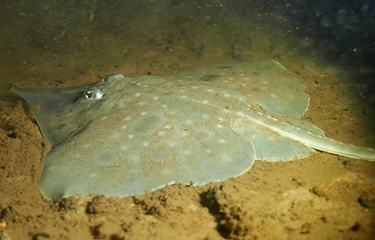More than 80 environmental organizations are calling on GlobalG.A.P. and Best Aquaculture Practices (BAP) certification schemes to revoke their certification of salmon and trout farms near Macquarie Harbour, Tasmania.
The certifications should be rescinded following the finding of evidence that fish farms in Macquarie Harbour are negatively impacting the waterway, which in turn is affecting the rare Maugean skate, the environmental groups said. Both Tasmania’s Threatened Species Protection Act and the Environment Protection and Biodiversity Conservation Act list the species as endangered.
The skate species is endemic to Macquarie Harbour, and according to scientists, has existed since the time of the dinosaurs. However, scientists at the University of Tasmania Institute of Marine and Antarctic Studies have found its population total to have dwindled in the past decade, likely dropping by half in the last seven years. Some scientists have also warned that the species is just one extreme weather event from extinction, The Guardian reported.
The call for action from environmental organizations comes as federal and state government officials meet in Hobart, Tasmania, to decide on action to protect the species. Environmental groups are in turn calling on both GlobalG.A.P. and BAP to stop “greenwashing” salmon and trout farms that are impacting the animals.
“Major supermarkets rely on these certifications to sell farmed salmon and ocean trout with their ‘responsibly sourced’ logos as part of their sustainable seafood policies,” SeaChoice Team Member Kelly Roebuck said. “But there is nothing responsible about driving one of the rarest skate species in the world to extinction.”
The environmental groups – which hail from 17 different countries – pointed out that a study by the University of Tasmania on the skate’s population status cited aquaculture as a factor in the changing environment of Macquarie Harbour. The degraded conditions in the harbor – including changing dissolved oxygen levels – were directly attributed to the presence of salmon farms. However, the study does not provide details of the allegedly deteriorating environmental conditions or how they are affecting the skate population.
“These certifications must not shirk their responsibility here. They cannot palm this off to the auditors or wait until the companies’ next audit to address this dire situation,” Bob Brown Foundation Antarctic Campaigner Alistair Allan said.
Other studies on the changing dissolved oxygen level in Macquarie Harbour have determined the changes can be attributed to a number of factors, not just fish farms. Research has found that the unique geography of the harbor creates multiple stratified layers of oxygen saturation, and changes in density can cause shifts in those layers that impact salmon.
The NGO letter is also not the first instance the presence of commercial aquaculture in Macquarie Harbour has been criticized. The presence of salmon pens in the harbor was a complicating factor in the sale of Huon Aquaculture in 2021, when Tattarang Agrifood Owner Andrew Forrest called for Huon to remove its salmon farms in the area.
“Tattarang wanted to remove the pens from Macquarie Harbour where they are environmentally destructive, and have caused deep upset to the local community,” Forrest said, according to The Age. “Our offer was predicated on fixing the environment, focusing on production in deep water high current environments, or on land.”
Tasmania's government has been working on a salmon industry plan to help manage the growth of the local aquaculture sector. But environmental groups and aquaculture opponents have been vocally critical of the government's plans for Tasmania, and of the actions of the major salmon-farming companies operating there.
Photo courtesy of the University of Tasmania







